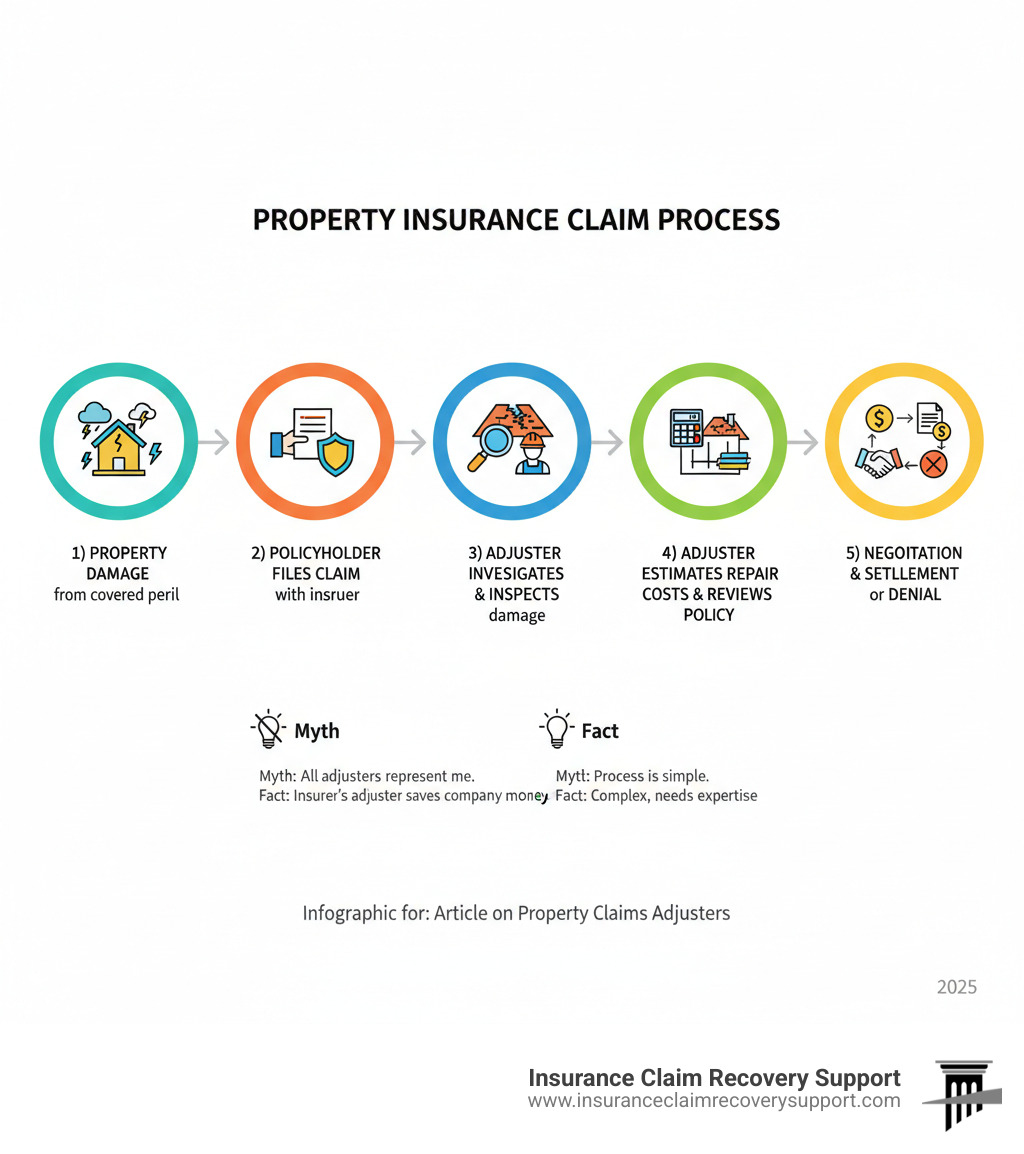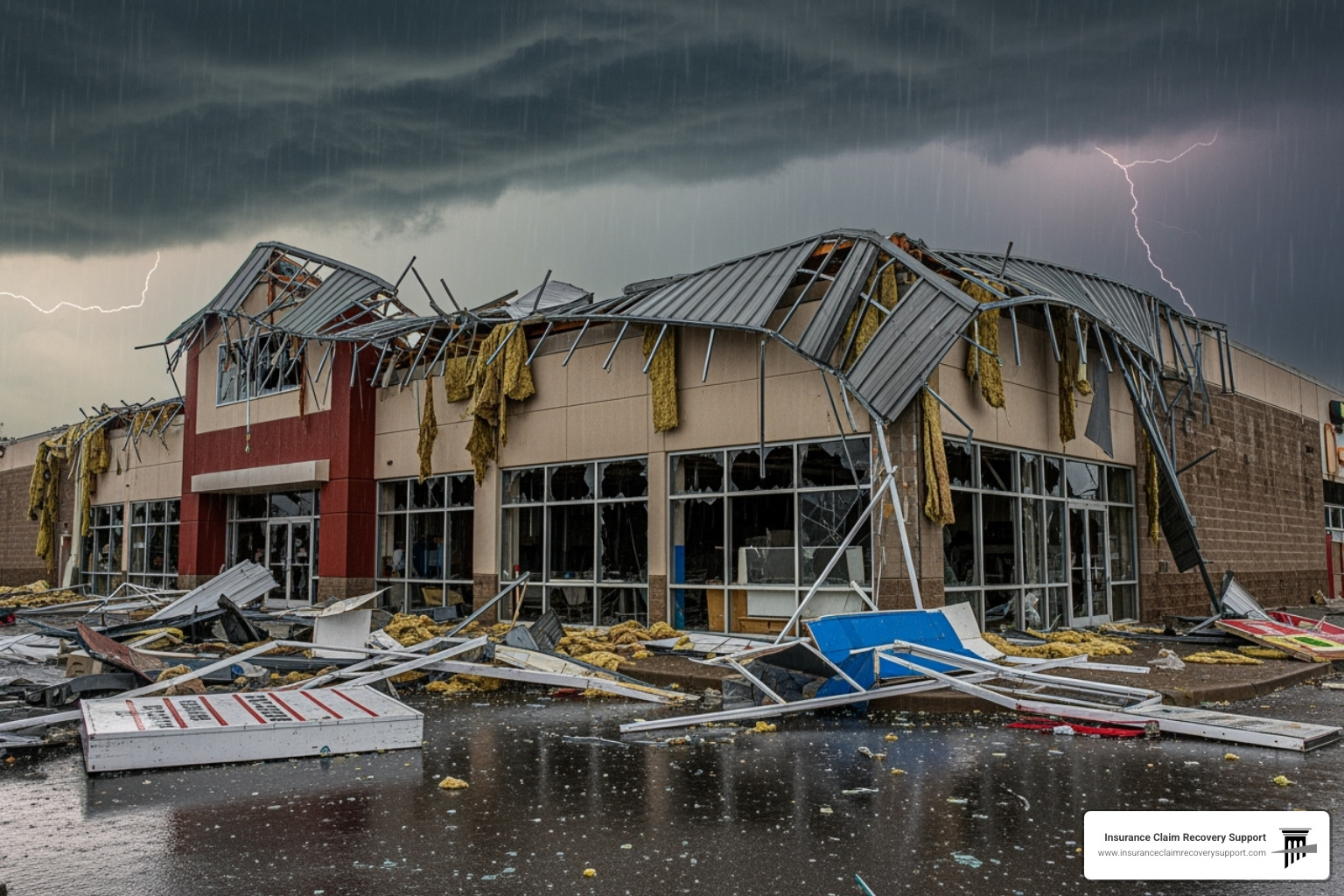Understanding Property Claims Adjusters and Their Role in Your Recovery
A property claims adjuster is an insurance professional who investigates, evaluates, and negotiates property damage claims to determine coverage and the final settlement amount. However, a critical distinction exists that every policyholder must understand: not all adjusters work for you. Some are employed by the insurance company with a duty to protect its financial interests, while others, known as public adjusters, are licensed professionals who advocate exclusively for you, the policyholder.
Quick Answer: What You Need to Know About Property Claims Adjusters
- Insurance Company Adjusters: These are salaried employees or independent contractors who work for your insurer. Their primary goal is to manage the claim according to company procedures, which often involves minimizing claim payouts to protect the insurer’s bottom line.
- Public Adjusters: These professionals work exclusively for you, the policyholder. They manage every aspect of your claim with the goal of securing the maximum possible settlement you are entitled to under your policy.
- Average salary: The annual salary for a property claims adjuster in the U.S. typically ranges from $54,520 to $76,790, with compensation often tied to performance metrics set by their employer.
- Primary responsibilities: Core duties include conducting on-site inspections of damage, carefully reviewing insurance policies, estimating the costs for repair or replacement, and negotiating the final settlement.
- Education requirements: A high school diploma is the minimum, but data shows that 76.9% of adjusters hold a bachelor’s degree, reflecting the complexity of the role.
- Key skills: Success in this field requires a blend of strong customer service, proficiency with estimation software like Xactimate, accurate damage estimation, and sharp negotiation tactics.
- Stress level: The job is demanding, with a reported stress level of 8.3/10 and a challenging work-life balance rated at 5.3/10.
Myth vs. Fact: Critical Distinctions �� ✅
Myth: All claims adjusters represent my interests as a policyholder.
Fact: This is the most dangerous misconception. Insurance company adjusters (both staff and independent) represent the carrier’s financial interests, not yours. Their professional duty is to their employer, and their goal is to resolve the claim for the lowest amount possible while adhering to the policy. A public adjuster is the only type of adjuster who represents you.
Myth: The claims process is straightforward and I don’t need help.
Fact: Commercial and multifamily property claims are notoriously complex. They involve interpreting dense policy language, adhering to strict documentation deadlines, and understanding intricate building codes and repair methods. For large-loss events, issues like business interruption, code upgrades, and multiple stakeholders (tenants, HOAs) add layers of difficulty. The complexity level is rated 8.4/10 for a reason.
Myth: I have to accept the first settlement offer.
Fact: The first offer is just that—an offer. It is a starting point for negotiation. You have the absolute right to dispute the amount, provide your own evidence and estimates, and negotiate for a fair settlement. Hiring a public adjuster is a powerful way to level the playing field and advocate for the full compensation you deserve on your behalf.
Whether you’re managing a commercial building, multifamily complex, homeowner association, hospital, hotel, manufacturing facility, or religious institution, understanding who your adjuster represents is critical to your financial recovery. When property damage strikes—from fire, hail, hurricanes, tornadoes, Texas freeze events, lightning, or floods—the adjuster assigned to your claim will significantly impact your settlement outcome.
The distinction between insurance company adjusters and public adjusters isn’t just semantic—it’s financial. While both investigate claims and estimate damages, their allegiances and objectives are fundamentally different. Insurance company adjusters are trained negotiators whose primary responsibility is limiting their employer’s liability. In contrast, public adjusters work exclusively for policyholders, leveraging their expertise to document, negotiate, and secure the maximum compensation available under the policy.
I’m Scott Friedson, a multi-state licensed public adjuster who has worked alongside and against property claims adjusters for over 15 years, settling hundreds of millions in commercial and multifamily property damage claims. Throughout my career handling over 500 large-loss claims for apartment complexes, HOAs, and commercial facilities, I’ve seen how the type of adjuster handling a claim determines whether a policyholder receives a fair settlement or faces the stress of underpayment, denial, or costly litigation.

The Role of a Property Claims Adjuster in Your Claim
When disaster strikes your commercial property, understanding the role of a property claims adjuster is paramount. These professionals are the gatekeepers to your insurance settlement, tasked with evaluating the damage, interpreting your policy, and ultimately determining the payout you receive. Their primary responsibilities include investigating the claim, assessing the extent of the loss, estimating repair or replacement costs, and negotiating a settlement.
However, as we’ve highlighted, not all adjusters are created equal, nor do they all work with your best interests at heart. Let’s dig into the different types of adjusters and the intricate process they follow to investigate and settle insurance claims.
Types of Adjusters: Who Represents Whom?
This is perhaps the most crucial distinction you, as a commercial property owner or manager, need to grasp. The type of adjuster involved in your claim directly influences the outcome.
| Feature | Insurance Company/Staff Adjuster | Public Adjuster |
|---|---|---|
| Allegiance | The insurance company that employs them. | The policyholder who hires them. |
| Goal | To investigate the claim according to company guidelines and limit the insurer’s financial liability. | To document and value the claim to achieve the maximum fair settlement for the policyholder under the policy terms. |
| Payment | Receives a salary from the insurance company, regardless of the settlement amount. | Paid a small, agreed-upon percentage of the claim settlement, creating an aligned financial interest with the policyholder. |
| Expertise | Trained in the insurer’s specific policies, procedures, and cost-estimation software to control claim costs. | Possesses deep expertise in policy interpretation, damage assessment, and negotiation strategies focused on advocating for the policyholder’s recovery. |
The table above reveals an inherent conflict of interest in the standard insurance claim model. The adjuster sent by your insurance carrier is an employee whose performance may be judged on their ability to close claims efficiently and for the lowest reasonable cost. Their loyalty is to their employer, not to you. This dynamic can lead to rushed inspections, overlooked damages, and lowball settlement offers that fail to cover the full cost of your recovery.
In contrast, a public adjuster operates with a fiduciary duty to act in your best interest. They are your exclusive advocate. Because they are compensated based on a percentage of the final settlement, their goals are perfectly aligned with yours: to secure the largest possible recovery. This alignment ensures they are motivated to find all covered damages, create exhaustive documentation, and negotiate aggressively on your behalf. For Texas policyholders, understanding your rights is the first step in this process. You can learn more from the Texas Department of Insurance’s Consumer Bill of Rights.
For owners of complex properties like apartment buildings, manufacturing plants, or hotels, this advocacy is not a luxury—it’s a necessity. A public adjuster levels the playing field, bringing expert knowledge to counter the insurance company’s team of adjusters and lawyers. Their involvement often leads to significantly higher settlements and can help prevent disputes from escalating into lengthy and expensive litigation.





